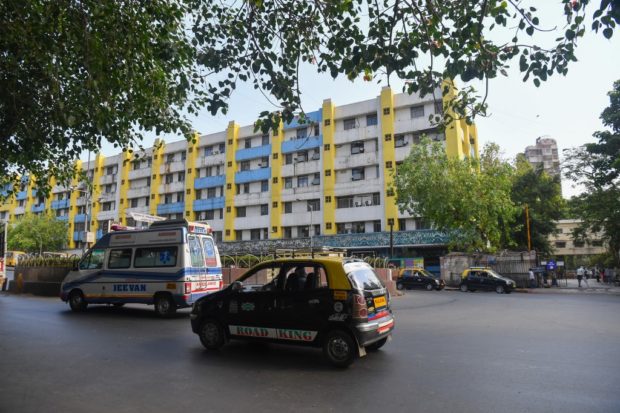
In this picture taken on May 15, 2020 vehicles drive past the Lokmanya Tilak Municipal General hospital during a nationwide lockdown to fight the spread of the COVID-19 coronavirus in Mumbai. Photo by Indranil MUKHERJEE / AFP
NEW DELHI — Mr Vikas Jain, 45, thought a strict countrywide lockdown, enforced since end March, bought time for the healthcare sector in India to cope with the surge in Covid-19 cases.
He was sadly mistaken.
On June 1, when his 47-year-old brother-in-law, fell ill, Mr Jain found it difficult to admit him into a hospital in Delhi mostly because of the recent explosion in the number of cases.
India is now the fifth-worst affected country in the world, with 276,583 Covid-19 cases. The capital, Delhi, which has 31,309 cases, is among the worst-affected cities in the country.
In Mr Jain’s case, the first two hospitals refused to take his brother-in-law, saying there were no beds. He was admitted by a third hospital but it discharged him after he tested positive for Covid 19, saying it did not have an isolation ward.
“They had no ambulances so I had to arrange for a private ambulance. The ambulance didn’t have an oxygen cylinder. I begged the hospital to give me one but they refused,” said Mr Jain.
A fourth hospital also had no beds and referred him to a fifth, where he and his sister, the wife of the patient, had to physically move the sick man from the ambulance to the room because health workers were overwhelmed by other Covid 19 cases.
Tragically, Mr Jain’s brother-in-law, a businessman, died on June 3 from Covid 19. Mr Jain’s sister and her children, aged 21, 18 and 12, have tested positive and are now in home quarantine.
Mr Jain said: “He passed away before my eyes. The hospital said you should cremate the body yourself. At the crematorium, me and my nephew, 18, bought PPE kits, which are sold there and we had to do the last rites ourselves.
“It is just too shocking for me. I am saying, everybody, please take care of yourself, There is no arrangement. I don’t have any words to express what we went through.”
Delhi is among seven cities – along with Mumbai, Chennai, Ahmedabad, Indore, Pune and Kolkata – accounting for 60 percent of Covid-19 cases in India.
Medical infrastructure has come under strain in all the cities, particularly in Delhi and Mumbai, with harrowing tales of desperate searches for admission amid a shortage of hospital beds and overworked healthcare staff.
Reports also speak of long queues at crematoriums in Delhi, with the government forced to open two additional ones.
“It is a massive, unprecedented challenge. By July 15, Delhi will need 33,000 beds… By July 31, we will need a total of 1.5 lakh (150,000) beds,” said Delhi chief minister Arvind Kejriwal on Wednesday (June 10).
“I will get started on this and go to stadiums, banquet halls and hotels to make arrangements. We will try everything to ensure enough hospital beds in Delhi,” he added.
Delhi, which has a population of 19 million and is the seat of power of the federal government, currently has 9,000 beds. An order to reserve hospital beds only for Delhi residents was reversed amid much controversy.
The city’s government has forecast it will have 500,000 cases by the end of next month.
Similarly, the situation is grim in the financial capital Mumbai, which now has 51,100 cases. Reports note the city has surpassed Wuhan, in China, where the first case was detected. Mumbai has 9,092 beds and practically all or 99 percent of the beds in intensive care units (ICU) are occupied. Ventilators are also running out, with 94 percent in use.
But World Health Organization officials say the number of cases in India is still not alarming, given its population of 1.3 billion. The recovery rate is now 48.88 per cent, according to the health ministry, which said that the number of patients who have recovered has for the first time exceeded those battling the virus.
Fatality rates are also low compared to other countries, at 7,745 deaths.
Still, the spike in cases in the major cities is disconcerting, as it follows the easing of the stringent lockdown late last month. Offices, restaurants and malls have reopened and public transport as well as cross-country movement have resumed, triggering worries of a fresh wave of infections.